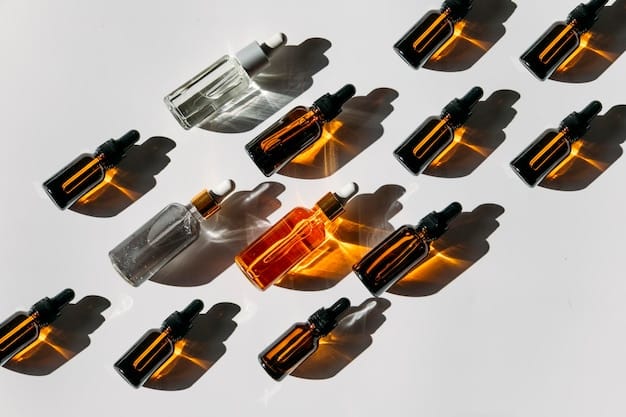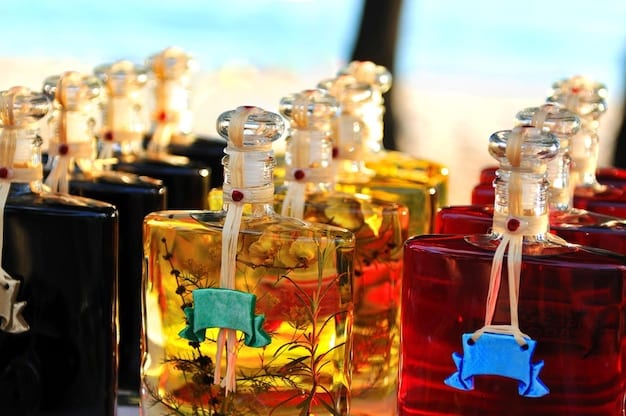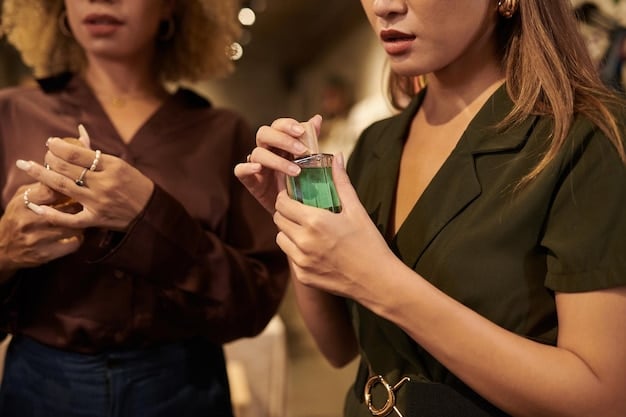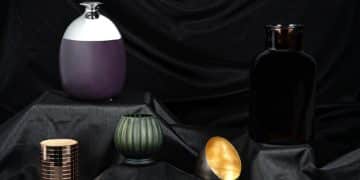Overhyped Perfumes: Fragrance Reviewers’ Unpopular Opinions Revealed

Unpopular Opinion: Fragrance Reviewers Reveal Overhyped Perfumes That Don’t Live Up to the Hype uncover fragrances lauded by marketing but criticized for lacking originality, underwhelming performance, or failing to justify their high price tags.
The world of fragrances is often filled with hype, with certain perfumes being lauded as must-haves. But do they always live up to the expectations? Unpopular Opinion: Fragrance Reviewers Reveal Overhyped Perfumes That Don’t Live Up to the Hype dives into the controversial takes of fragrance experts who dare to question the status quo.
The Allure of Perfume Hype
Perfume advertising can be incredibly persuasive. Luxurious campaigns, celebrity endorsements, and carefully crafted descriptions all contribute to building anticipation and desire. But is the reality always as captivating as the marketing promises?
The fragrance industry thrives on creating an aura of exclusivity and aspiration. Through clever marketing, brands can transform a simple scent into a symbol of status, romance, or adventure. However, this can lead to inflated expectations and, ultimately, disappointment when the perfume doesn’t deliver.
The Power of Marketing
Marketing plays a crucial role in shaping consumer perceptions of perfume. Brands invest heavily in crafting compelling narratives and associating their products with desirable lifestyles. This can lead to a disconnect between the perceived value of a fragrance and its actual quality.
The Role of Influencers
In today’s digital age, fragrance influencers wield considerable power. Their reviews and recommendations can significantly impact a perfume’s popularity. However, it’s important to consider whether these endorsements are genuine or driven by sponsorships.
- Marketing creates allure, sometimes unfairly.
- Perfume influencers can be persuasive.
- Hype can lead to disillusionment when reality sets in.
Ultimately, the allure of perfume hype can be a double-edged sword. While clever marketing can introduce us to exciting new fragrances, it’s essential to maintain a critical perspective and not let hype dictate our purchasing decisions.

The Underwhelming Reality: Fragrances That Disappoint
Despite the glossy advertisements and glowing reviews, some perfumes simply fall short of expectations. Whether it’s due to poor longevity, lack of originality, or an unbalanced composition, certain fragrances fail to live up to the hype.
Fragrance reviewers often encounter perfumes that are praised for their unique notes or innovative blends, only to find them underwhelming in reality. These disappointments can stem from a variety of factors, including the overuse of synthetic ingredients or a lack of complexity in the fragrance’s development.
Longevity Issues
One of the most common complaints among fragrance enthusiasts is poor longevity. A perfume that fades within a couple of hours, regardless of its initial scent, is often considered a disappointment. The disappointment is even bigger when this poor performance is attached to a high price tag.
Lack of Originality
In a market saturated with new fragrances, finding something truly original can be a challenge. Many perfumes borrow heavily from existing trends, resulting in a lack of distinctiveness and a sense of déjà vu. Some may call this lack of originality boring.
The reality is that perfumes don’t always deliver on their promises. Many factors can contribute to a disappointing fragrance experience, from longevity issues and lack of originality to synthetic ingredients and unbalanced compositions. It’s essential to approach perfume purchases with a discerning eye and not be swayed solely by marketing hype.
The “Safe Scents” That Spark Debate
Certain perfumes, often labeled as “safe scents” due to their mass appeal, tend to elicit strong opinions from fragrance reviewers. These fragrances, while generally pleasant and easy to wear, are sometimes criticized for lacking boldness or innovation.
The concept of a “safe scent” is subjective and varies from person to person. However, these fragrances typically share common characteristics, such as a clean and fresh profile, subtle sweetness, and a lack of polarizing notes. While these scents are often praised for their versatility and wearability, they can also be seen as uninspired or lacking in character.
The Appeal of “Safe Scents”
The appeal of “safe scents” lies in their approachability and versatility. These fragrances are often suitable for a wide range of occasions and settings, making them popular choices for everyday wear. They are also less likely to offend or overwhelm those around you.
The Argument Against “Safe Scents”
Critics of “safe scents” argue that these fragrances sacrifice uniqueness and complexity for mass appeal. They often express a preference for perfumes that are more daring, experimental, and challenging.
- “Safe scents” appeal to many due to their versatiliy.
- Critics find them too generic and uninspired.
- Finding the right balance is a matter of personal taste.
The debate surrounding “safe scents” highlights the subjective nature of fragrance appreciation. What one person finds comforting and wearable, another may perceive as boring and predictable. Ultimately, the choice of whether to embrace or reject “safe scents” comes down to personal preference.
The Power of Personal Preference
Fragrance is an incredibly personal experience. What smells divine to one person may be unpleasant to another. This subjectivity makes it difficult to objectively judge a perfume’s quality or appeal.
Personal experiences with scent can also significantly influence our preferences, whether positive or negative. A fragrance that reminds us of a cherished memory may evoke feelings of joy and nostalgia, while one associated with a negative experience may trigger feelings of aversion.

The Influence of Memory
Scent is closely linked to memory, and certain fragrances can transport us back to specific moments in time. This connection between scent and memory can influence our perception of a perfume’s beauty or desirability.
The Impact of Skin Chemistry
A perfume’s scent can change depending on the wearer’s skin chemistry. Factors such as pH levels, hormones, and diet can all affect how a fragrance develops and interacts with the skin. Some perfumes may smell amazing on one person but completely different on another.
The power of personal preference in fragrance appreciation cannot be overstated. Factors such as memory, skin chemistry, and individual tastes all play a significant role in shaping our perceptions and preferences. Embracing this subjectivity allows us to explore the world of fragrance with an open mind and discover scents that truly resonate with us.
Price vs. Performance: Is It Worth the Cost?
The price of a perfume doesn’t always correlate with its quality or performance. Some expensive fragrances fall short of expectations, while more affordable options can offer exceptional value.
Many factors contribute to the price of a perfume, including the cost of raw materials, the complexity of the formula, the brand’s marketing budget, and the exclusivity of the packaging. However, these factors don’t always guarantee a superior scent or longevity.
The Appeal of Niche Perfumes
Niche perfumes, often priced higher than mainstream fragrances, are marketed as exclusive and unique creations. While some niche perfumes offer innovative and high-quality scents, others may simply rely on clever marketing to justify their high price tags.
The Value of Affordable Options
Many affordable perfumes offer excellent value for their price. These fragrances may not have the same level of complexity or prestige as their more expensive counterparts, but they can provide enjoyable scents with decent longevity.
- Price and quality are not always aligned.
- Niche perfumes can justify higher prices with originality.
- Affordable perfumes can be surprisingly appealing.
The relationship between price and performance in the fragrance world is complex and often misleading. It’s essential to consider factors beyond the price tag when evaluating a perfume’s worth. Testing and researching scents can help guide you to a purchase to be happy with.
Decoding the Fragrance Jargon
The world of fragrance is filled with specialized terminology that can be confusing for newcomers. Understanding the key terms and concepts can help you navigate the market and make informed purchasing decisions.
From top notes and base notes to accords and sillage, the language of fragrance can seem daunting. However, learning the basic vocabulary can empower you to understand fragrance descriptions, reviews, and compositions more effectively.
Key Fragrance Terms
Understanding terms like notes, accords, and dry down can make it easier to follow fragrance reviews and understand the way the perfume evolves. Become educated so you can better understand the fragrences around you.
Understanding Fragrance Families
Perfumes are often categorized into different fragrance families, such as floral, woody, oriental, and citrus. Familiarizing yourself with these categories can help you identify scents that align with your preferences. For example, if you know you like floral scents, finding a scent you enjoy becomes easier.
Decoding the jargon of the fragrance world can empower you to make informed purchasing decisions and deepen your appreciation for the art of perfumery. By learning the key terms, understanding fragrance families, and recognizing the role of ingredients, you can navigate the market with confidence and discover scents that truly resonate with you.
| Key Point | Brief Description |
|---|---|
| 🔍 Hype vs. Reality | Fragrance marketing often creates unrealistic expectations. |
| 👃 Personal Preference | Fragrance is subjective; what works for one may not work for another. |
| 💰 Price & Performance | Higher price doesn’t guarantee better scent or longevity. |
| 📚 Fragrance Jargon | Understanding fragrance terminology helps in making informed decisions. |
Frequently Asked Questions
▼
A perfume is often considered overhyped when its marketing promises exceed its actual performance or originality, leading to disappointment among consumers and reviewers.
▼
Reviewers assess factors like longevity, sillage, uniqueness, and value for money, comparing their experiences to the fragrance’s marketing claims and the overall market.
▼
No, price doesn’t always equal quality. Some expensive perfumes rely on brand recognition, while affordable options can offer excellent scents and performance.
▼
Influencers can drive hype through reviews, recommendations, and collaborations, but it’s crucial to discern genuine enthusiasm from paid promotions for credibility.
▼
Do your research, read multiple reviews, test samples on your skin, and consider your personal preferences before investing. Avoid impulse buys based solely on marketing.
Conclusion
Navigating the hyped world of fragrances requires a discerning nose and an understanding of personal preferences. While marketing often exaggerates, individual experiences remain paramount. Explore diverse opinions, test scents independently, and prioritize what truly resonates with you to discover lasting olfactory satisfaction.





